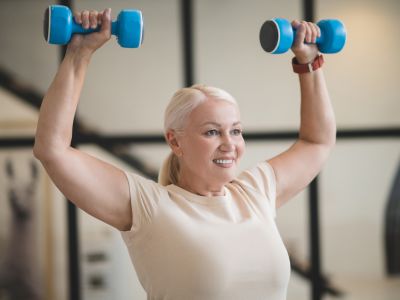For women over 40, fatigue, fluctuating energy levels, and increased cravings can make day-to-day life feel more exhausting than fulfilling. If you’re finding it harder to maintain consistent energy throughout the day or noticing increased sugar cravings, you’re not alone. Many women experience these changes as they enter midlife. However, research in women’s physiology has found physical exercise, particularly strength training, helps alleviate these nagging symptoms and promotes health as you age.
Strength training for women over 40 can be a powerful solution for cravings and low energy offering both physical and mental health benefits that support healthy aging. By incorporating strength training, and making thoughtful adjustments to your nutrition, you can build muscle, feel less tired, and balance blood sugar levels. This guide will show you how strength training can change your life and why it’s never too late to start.
Why Strength Training is Essential for Women Over 40 vs Cardio Workouts
Strength training is often overlooked in favour of cardio exercises, such as running or walking, in women over 40. Many women are compelled towards low-impact activities like yoga and walking. While these activities are important for improving flexibility, stability, emotional resilience, and mental health, they don’t address the loss of muscle mass that naturally occurs as we age.
Starting in your 30s, muscle mass declines. The rate varies but it could be as much as an 8% loss per decade, says health experts. Luckily, adding strength training into your routine can help you build strength and maintain muscle with age.
Women Who Strength Train Live Longer
Not only is lower muscle mass associated with increases in metabolic syndrome and cardiovascular disease, it’s a predictor of longevity. Aging well requires significant muscle mass and strength.
5 Science-Backed Reasons Women Should Do Strength Training to Age Well
By incorporating strength exercises into your routine, you’ll be setting the foundation for better health, both now and as you continue to age.
- Strength for Physical Movement: Muscle provides the strength and stability that is essential for physical movements.
- Cognitive Function with Age: Muscular strength has impacts on cognitive function with age.
- Blood Glucose Maintenance: Muscle is crucial for the maintenance of blood sugar control.
- Reduce Cravings: Strength training can at least temporarily reduce hunger-inducing hormones, and increase the hormones that help suppress appetite: a swing in hormones that can help reduce cravings.
- Weight Loss and More Energy: Muscle has significant impacts on energy metabolism in the body. As such, less muscle can lead to a slower metabolism, making it harder to maintain a healthy weight and energy levels.
How Often Should Women Over 40 Do Strength Training?
With age and menopause, strength and power of the muscles declines. In the Physical Activity Guidelines for Americans, it is recommended that adults get a minimum of 2.5 hours of moderate-intensity exercise a week (that’s about 30 minutes per day of sweaty work), with strength training at least two days a week. Newer studies suggest that post-menopausal women do best with strength training more than 2 times per week, in which they get more than 6-8 sets per muscle per week. As such, aiming for 3 strength training workouts per week may be ideal for women over 40.
What is the Best Weight Training for Women Over 40?
Maximum strength gains come from the use of heavier loads than longer, lighter weights. Not sure what that means? If the weights you’re lifting are light enough that you can do closer to 15 repetitions before you feel you might lose form, it’s time to increase your weights. Exercise physiologist researchers suggest fewer repetitions of 8-10 are best for women over 40 looking to build strength and age well.
Health Benefits of Strength Training for Women
Strength training offers far more than just toned muscles. Women over 40 can reap a variety of health benefits by lifting weights or performing resistance exercises, such as push-ups. Here are some of the key health benefits of strength training for women:
- Increased Muscle Mass and Strength: Building and maintaining muscle becomes more challenging as we age, but strength training in women helps to preserve and increase muscle tissue. This is crucial for keeping your metabolism high and reducing the risk of age-related muscle loss, also known as sarcopenia.
- Bone Density Support: Women are more susceptible to osteoporosis, especially after menopause. Robust evidence shows strength training helps to improve bone density, reducing the risk of fractures and other bone-related issues.
- Cognitive Function with Age: When a women increases her muscle strength through strength training it has a positive impact on the central nervous system. Research shows this helps neural pathways which is important for improving cognitive function as we age.
- Improved Metabolism and Weight Management: Heavy lifting improves fat burning metabolism, a process that slows as women hit perimenopause and is worst after menopause. Since muscle burns more calories than fat tissue, increasing your muscle mass through strength training can help boost your metabolism.
- Better Posture and Joint Health: Strength training improves the stability and strength of muscles surrounding your joints, which can alleviate joint pain and improve posture. This is particularly important for preventing injuries as you age.

Mental Health Benefits of Strength Training for Women
The mental health benefits of strength training for women are profound. Exercise is known to be a powerful tool for managing stress, anxiety, and depression, but strength training specifically has been shown to offer unique advantages for mental wellness.
- Enhanced Mood: Mounting research supports the addition of strength training in women with depressive symptoms into a healthy, holistic lifestyle. In fact, research even suggests one of the mental health benefits of strength training for women is happiness.
- Less Anxiety: No matter what your age, muscular strength or cognitive function, research shows older women notice less anxiety when their lifestyle includes strength training.
- Self-Confidence: Women who participate in strength training activities build self-acceptance, experience feelings of person growth and gain confidence from achieving intrinsic goals, shows research.
Nutrition for Strength Training in Women Over 40: A Holistic Nutrition Approach
Women are different than men. Research shows while men’s muscles enjoy protein (particularly leucine) during exercise, women derive more of their energy needs during exercise from fat. Meanwhile, women’s bodies likely need more protein after exercise to create the ideal environment for muscle mass increase, building strength and recovery.
How Sex Hormones Impact a Woman’s Protein Intake Needs
For women, adequate protein is particularly important to support our hormonal fluctuations that can cause our body to be more inclined to break down muscle. This occurs after ovulation and during the luteal phase when progesterone rises. Progesterone breaks down proteins to provide amino acids as building blocks for the uterine lining. Women need more protein during this higher progesterone time to lessen the impact on your muscles.
Should You Eat Protein Before or After Exercise? Holistic Sports Nutrition for Women
According to the American College of Sports Medicine, pre-exercise protein ingestion helps the human body:
- Increase lean muscle mass
- Strength
- Reduces fat mass
- Improves recovery
While some protein is helpful before exercise for women, carbohydrates may also be important – particularly if working out early in the morning. Research suggests exercising while fasted is not a good idea. Exercising in a fasted state is stressful, encouraging the production of more cortisol. As women over 40 already struggle with high cortisol levels thanks to hormonal changes, this additional stimulus isn’t ideal.
After exercise, women will benefit from eating nutritious foods that contain protein. For up to 48 hours after strength training, there’s an increase in protein turnover in the muscles. As such, it’s important to provide enough energy, including protein to ensure sufficient amino acids are available to repair and build muscle. Without post exercise protein your muscles can’t successfully improve their strength.
How Much Protein Should Women Over 40 Eat?
The amount of protein a woman needs can vary. The recommended daily allowance for women is 10-35 percent of your daily energy intake. For a 165-pound woman, that would be around 60g of protein in a day. However, research suggests women aim for higher amounts, (1.7-1.8g/kg) when their goal is to increase strength and muscle, which is about 115 grams of protein per day.
Nutrition, Strength Training and Balancing Energy and Blood Sugar
One of the most common complaints among women over 40 is fluctuating energy levels, often tied to imbalanced blood sugar. Many women experience cravings for sugary or high-carbohydrate foods when their blood sugar drops, which can lead to fatigue, mood swings and difficulty concentrating. While strength training helps improve insulin sensitivity, making it easier for your body to regulate blood sugar, pairing it with a holistic nutrition approach amplifies these effects.
Science-Backed Tips for Controlling Blood Sugar and Boosting Energy:
- Prioritize Protein: Protein plays a crucial role in regulating blood sugar levels by slowing down the absorption of sugar into your bloodstream. After a strength training session, consuming a protein-rich meal can help rebuild muscles and maintain steady energy levels throughout the day. Incorporate lean sources like chicken, fish, eggs, or plant-based options such as lentils, nuts, beans and quinoa into your meals.
- Fiber-Rich Foods: Foods high in fiber, such as leafy greens, whole grains and legumes, help keep your blood sugar stable. Fiber slows the digestion process, preventing spikes and crashes in blood sugar that contribute to feeling restless, then tired.
- Healthy Fats: Healthy fats, like those found in avocados, nuts and olive oil, play an important role in curbing cravings for unhealthy carbs.
- Stay Hydrated: Dehydration can mimic the symptoms of low blood sugar, making you feel sluggish or fatigued. Be mindful of drinking water regularly.
Understanding Cravings: What Your Body is Telling You
 Many women over 40 notice an increase in cravings for sweets or carbohydrates, which can feel overwhelming at times. These cravings are often signals from your body that something is out of balance. Understanding why these cravings occur can help you take control of your health.
Many women over 40 notice an increase in cravings for sweets or carbohydrates, which can feel overwhelming at times. These cravings are often signals from your body that something is out of balance. Understanding why these cravings occur can help you take control of your health.
- Sugar Cravings: If you find yourself reaching for sweets frequently, it could be a sign that your blood sugar levels are fluctuating too much. This is often a result of consuming too many processed carbs, while not enough protein and fiber.
- Fat Cravings: Craving fatty foods like cheese or fried items may indicate that your body needs healthy fats. Instead of reaching for unhealthy options, try snacking on nuts or adding avocado to your meals.
- Salt Cravings: A desire for salty foods can often be linked to dehydration. But, new research suggests salt cravings are also common in those struggling with depression, anxiety and stress. When you feel this craving, take a moment to assess whether you’ve had enough water or if you’re feeling anxious. Hydrates or carve out time for some mental health strategies such as meditation, journaling or a nature walk.
A Holistic Approach to Aging Well
Strength training in women over 40 is just one piece of the puzzle. When combined with holistic nutrition and mindfulness practices, it can significantly enhance your quality of life and help you age with grace and strength.
At the Canadian School of Natural Nutrition, we offer classes and webinars that dive deeper into these topics, providing you with the knowledge and tools you need to thrive in midlife and beyond. If you’re interested in a deeper understanding of how nutrition impacts your health, consider enrolling in our Natural Nutrition Diploma Program. Available in-class or distance education, this program is designed to empower you with the practical skills and confidence to take control of your health, improve your well-being, and help others to do the same.
Embrace the journey of healthy aging and build a life of strength, vitality, and balance with the support of nutrition and strength training. You’ve got the power to thrive!
